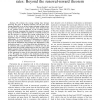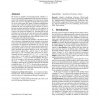475 search results - page 32 / 95 » Formal Analysis of Processor Timing Models |
AAAI
2010
14 years 11 months ago
2010
Multi-Agent Plan Recognition (MAPR) seeks to identify the dynamic team structures and team behaviors from the observations of the activity-sequences of a set of intelligent agents...
FOCI
2007
IEEE
15 years 3 months ago
2007
IEEE
— We evaluate the average waiting time between observing the price of financial markets and the next price change, especially in an on-line foreign exchange trading service for ...
73
Voted
DATE
2003
IEEE
15 years 2 months ago
2003
IEEE
The growing impact of within-die process variation has created the need for statistical timing analysis, where gate delays are modeled as random variables. Statistical timing anal...
75
Voted
ACISICIS
2005
IEEE
15 years 3 months ago
2005
IEEE
: This paper presents a queuing analysis model of a PC-based software router supporting IPv6-IPv4 translation for residential gateway. The proposed models are M/G/1/K or MMPP-2/G/1...
TOCS
2008
14 years 9 months ago
2008
We present an adaptive work-stealing thread scheduler, ASTEAL, for fork-join multithreaded jobs, like those written using the Cilk multithreaded language or the Hood work-stealing...


